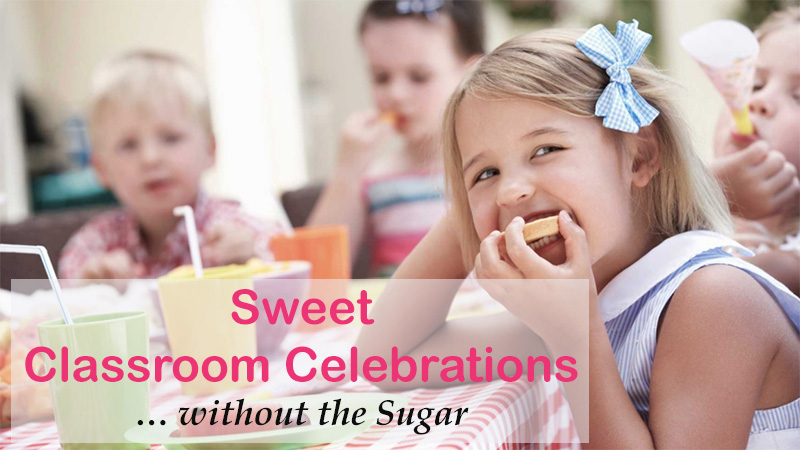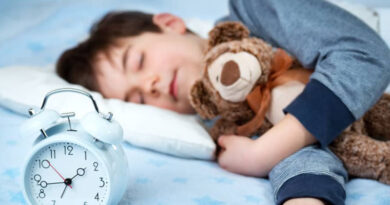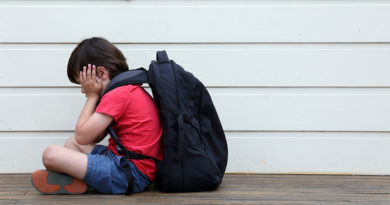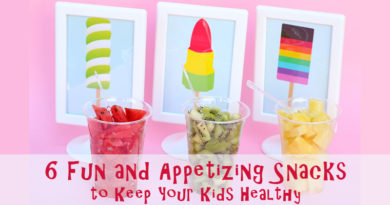Sweet Classroom Celebrations without the Sugar
No cupcakes in classrooms. The news is whispered amongst parents in scandalous tones. What next? No balloons? No candy? No recess? Where will they draw the line? Some parents are outraged. Others simply disappointed. And then there are the few who are relieved. Teachers are torn.

Classroom Celebrations – Too Sweet?
Birthday celebrations are popular amongst elementary school kids and in preschools across the nation. Children of all ages anxiously await their own special day, they choose their treats with care, anticipate the envious looks of classmates, and savor the thought of their five minutes of fame.
Parents recall their school days with fond memories of birthday crowns and smiling classmates. That one day when they were the coolest kid on the playground, the bearer of cupcakes and a slightly shortened math lesson. Or they look back with regret, recalling with a slight pang their own neglected birthday, when a disappointed classmate sent them a reproachful look and they sank a little lower in their seat, guilty of depriving the class of a small celebration.
Parents are proud of their children, they want to celebrate the day of their birth. They want to make the day as special as they can, not just with a week end bash, but with classroom recognition. It’s only once a year, for them, and a bit of candy and cupcakes seems harmless.
However, multiply that one day, once a year, by 32 kids. Add in the requisite Halloween Party, Winter Break party, Valentine’s Day party, Spring into Spring party and End of Year party (Or whatever days your school chooses to celebrate) and there’s a lot of sugar coursing through those little veins. Take into account that both food allergies and obesity are on the rise, and the concern many parents are showing over their limited control over their child’s diet outside of the home (and the fact that most kids eat more meals and snacks away from home than in home) and you’ve got a serious problem.
Where to draw the line? Since most children spend the majority of their days in a classroom, the logical step is for schools to step in. And many have, with the dreaded cupcake ban.
Most school superintendents will tell you the goal is not to deny children their moment of glory. Many teachers are working with parents to find ways to comply with the ban, without actually banning celebrations. Some schools have adopted a once a month party, where students are recognized as a group on the first day of their birthday month, and classmates are treated to cookies after singing Happy Birthday. Others simply encourage ‘healthy treats’ and turn a blind eye to the occasional cupcakes, as long as they are store bought. Still more have banned sweets but permit fruit or small toys to be passed out by the birthday child. Most are still trying to find the right balance to make everyone happy.
Are birthday celebrations necessary?
Are birthday celebrations necessary for the school child? The short answer is no. Birthday parties add nothing to the curriculum, and can easily turn into popularity contests with parents and children working hard to out do each other at subsequent celebrations. Some would argue that the anticipation of a sugary treat lowers concentration levels and productivity in the classroom, the party itself interferes with precious instruction time, and between the sugar high and adrenaline rush the entire day is mostly wasted.
On the other hand, some would argue that every child deserves to celebrate their own special day. Being the center of attention for a limited amount of time boosts children’s morale, encourages self confidence and provides a much needed break in the long scholastic day. Birthday celebrations can brighten up a mundane week, serving to increase, rather than decrease, productivity in the classroom. They can encourage classroom unity as all the kids celebrate together.
Realistically, the physical amount of instruction time lost to a birthday celebration is minimal. It does not take long to pass out 32 cupcakes, and celebrations are often coupled with planned recesses or free time periods. Children in preschool or early elementary school learn about taking turns, respect for others, and good manners. Upper graders can learn about supply and demand, planning skills, and treating people with respect. All ages can practice patience in waiting for the coveted event. Celebrations can be a useful tool in creating a positive learning environment, regardless of their relevance to a lesson plan.
While the various aspects of a birthday celebration can be broken down and debated separately, the fact of the matter is that birthdays are fun. Parties, no matter how short or what their reason is, are fun. And anything that makes school a little more fun excites both students and teachers.
This leads us back to the original problem. Small celebrations, and occasional parties, may be harmless or even beneficial to students. But, sugar and artificial coloring and flavorings certainly aren’t beneficial to anyone. So what’s a parent to do? How can you celebrate your child’s special day without exciting their taste buds?
Unfortunately, our society has associated food with fun for so long that it is difficult to imagine one without the other. Parties=cake. It’s a simple equation. And yet, there is increasing frustration with this equation. It’s time to break the mold. The trouble is, no one wants to start. It’s much easier to follow the trend, wait for “someone to do something” or grumble about new policies.
So what happens when it’s your child’s special day? What can you do to help celebrate, if you’re no longer permitted to simply take a trip to the local bakery?
First off, talk to your child. They may have some great ideas that you’d never have dreamed of. And if their idea seems a little off the wall, keep an open mind. It is their day, after all.
Healthier Options
A few ideas to help jump start your (and your child’s) creative juices:
–Fruit. Fresh fruit is not quite as convenient as packaged sweets, but it can be fun. Many produce departments carry fruit trays, or you can cut your own. Try berries, melon or stone fruits. You can make kebobs, or fruit cups, or give the kids paper cups and forks and let them help themselves. If there are no dairy allergies in your child’s class, yoghurt dip might make the fruit more festive. Another fun option is to use cookie cutters on slices of melon.
–Other somewhat healthy food items include yoghurt cups, granola bars, mini muffins (not chocolate-chocolate chip), applesauce tubes, popcorn and individual bags of whole grain crackers or pretzels. Some kids might enjoy bringing mini bagels with cream cheese, or even hosting a lunch-time pizza party. (Though some might argue that pizza still qualifies as junk food) You will have to check with your school for their snack guidelines.
–Consider bringing a goody bag for each student. Fill it with fun themed school supplies, like pencils, erasers and bookmarks. Small party favors such as bouncy balls or glow in the dark animals are also appreciated by the under 12 crowd.
–A small gift per student, such as a notebook or stationary set. These can be found at very affordable prices in dollar stores. Depending on what you choose, the cost can be comparable to cupcakes, punch and napkins.
–Have your child make a classroom donation. Books, educational games, or other items for use in the class room can be wrapped and presented to the class. A library book with your child’s name and birthday listed in the front cover is another possibility. Some children are excited by the idea of a tangible gift that will last for years.
–Donate your time. Ask your child’s teacher about coming in to read a story, or sponsor an art (or even PE) lesson for your child’s special day. With increased budget cuts, many schools have had to remove various art related activities from their lesson plans. If you give the teacher enough notice, the two of you can work together to provide not only a fun experience for the students, but one that enhances the curriculum. With the guidance of your student and teacher, you can choose something as simple as coming in as a guest reader for a half hour, or as fancy as a full blown art project. If you have the connections, you might even bring in a guest speaker. Now that’s a birthday to remember!



